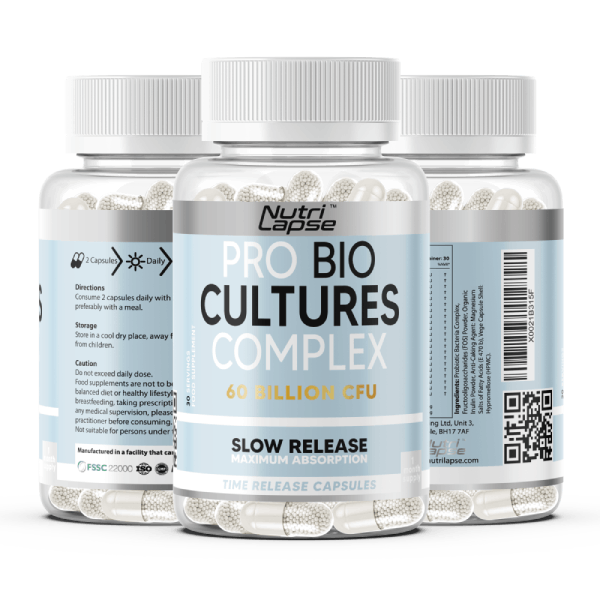
The Benefits of Probiotics for Gut Health: A Deep Dive into Digestion and Immune Health
In recent years, probiotics have gained significant attention in the health and wellness world, and for good reason. These live microorganisms, often referred to as “good” or “friendly” bacteria, can have a profound impact on our overall health, particularly when it comes to our gut. With digestive issues becoming increasingly common and research continuing to uncover the gut’s role in immune function, understanding the benefits of probiotics is more important than ever.
Let’s explore the role probiotics play in gut health, how they can improve digestion, and how they contribute to a stronger immune system.
What Are Probiotics?
Probiotics are live bacteria and yeasts that are beneficial for your health, especially for your digestive system. While bacteria are often thought of negatively as something that causes illness, probiotics are different. They are good bacteria that help keep your gut healthy. These microorganisms are found in certain foods and supplements and are naturally present in your body.
The most common types of probiotics belong to two groups:
Lactobacillus: Found in yogurt and fermented foods, Lactobacillus is one of the most common probiotic strains and is particularly helpful for those who are lactose intolerant.
Bifidobacterium: Found in some dairy products, this strain is known for its ability to ease irritable bowel syndrome (IBS) and other digestive conditions.
How Probiotics Benefit Gut Health
Restores Balance in the Gut Microbiome
The gut microbiome is a complex ecosystem of bacteria that plays a crucial role in digestion, metabolism, and immune regulation. When the balance of bacteria in the gut is disrupted—often by poor diet, stress, antibiotics, or illness—it can lead to digestive problems like bloating, gas, and diarrhea. Probiotics help restore this balance by replenishing the levels of good bacteria, promoting a healthier and more diverse microbiome.
Improves Digestion
A healthy gut is essential for proper digestion. Probiotics aid digestion by breaking down food more effectively and helping the body absorb nutrients. Certain strains, like Lactobacillus and Bifidobacterium, produce enzymes that support the digestion of fibers and complex carbohydrates, which can otherwise be difficult for the body to process. This results in better nutrient absorption and less bloating and discomfort.
Reduces Symptoms of Digestive Disorders
For individuals who suffer from digestive disorders such as irritable bowel syndrome (IBS), inflammatory bowel disease (IBD), or diarrhea, probiotics can provide relief. Studies have shown that specific probiotic strains can alleviate symptoms such as abdominal pain, bloating, constipation, and diarrhea by improving the gut’s overall function and reducing inflammation.
Prevents and Treats Diarrhea
One of the most well-known benefits of probiotics is their ability to prevent and treat diarrhea. Diarrhea is a common side effect of taking antibiotics, which can disrupt the natural balance of bacteria in the gut. Probiotics, especially strains like Saccharomyces boulardii, help restore the balance of good bacteria, reducing the risk of antibiotic-associated diarrhea. Additionally, they can help manage other forms of diarrhea, such as that caused by infections or food intolerances.
Probiotics and Immune Health
Boosts Immune Function
A significant portion of the immune system resides in the gut, making gut health a critical factor in immune response. Probiotics enhance immune function by increasing the production of antibodies and activating certain immune cells like macrophages and T cells, which are responsible for identifying and destroying harmful pathogens. By supporting a healthy gut microbiome, probiotics help the immune system function more efficiently, reducing the likelihood of infections.
Reduces Inflammation
Chronic inflammation is linked to a wide range of health conditions, including autoimmune diseases and allergies. Probiotics can help reduce inflammation in the gut, which has a ripple effect on reducing systemic inflammation throughout the body. This is particularly beneficial for individuals with inflammatory conditions like Crohn’s disease or ulcerative colitis.
Prevents Respiratory Infections
Some studies suggest that probiotics may help reduce the frequency and severity of respiratory infections, such as the common cold or flu. By supporting the gut’s role in immune regulation, probiotics may help prevent harmful pathogens from entering the bloodstream and spreading throughout the body.
Sources of Probiotics
Fermented Foods
One of the most natural ways to incorporate probiotics into your diet is through fermented foods. Some popular sources include:
Yogurt: Look for yogurt with live and active cultures.
Kefir: A fermented milk drink loaded with probiotic bacteria.
Sauerkraut: Fermented cabbage that contains probiotics, particularly if it’s unpasteurized.
Kimchi: A spicy Korean dish made from fermented vegetables.
Miso: A fermented soybean paste used in Japanese cuisine.
Kombucha: A fermented tea that is rich in probiotics.
Probiotic Supplements
For those who don’t consume fermented foods regularly, probiotic supplements can be a convenient alternative. These supplements are available in various forms, including capsules, powders, and liquids. It’s important to choose a high-quality supplement that contains well-researched strains like Lactobacillus and Bifidobacterium, as well as a high number of colony-forming units (CFUs) for maximum effectiveness.
How to Choose the Right Probiotics
When selecting probiotics, it’s essential to choose products that contain specific strains known to benefit gut and immune health. Look for supplements or foods with multiple strains to support diversity in the gut microbiome. It’s also a good idea to start with lower doses and gradually increase to avoid digestive discomfort. Consulting a healthcare professional can also help ensure you’re choosing the right probiotic strain for your unique health needs.
Conclusion
Probiotics are a powerful ally when it comes to gut health, digestion, and immune function. By supporting a balanced and healthy gut microbiome, probiotics can improve digestion, alleviate symptoms of digestive disorders, and enhance immune health. Whether through fermented foods or supplements, incorporating probiotics into your daily routine can lead to better gut health and, in turn, improved overall well-being.
As research continues to reveal more about the gut’s influence on other systems in the body, it’s becoming increasingly clear that nurturing your gut health with probiotics is an investment in long-term health and vitality.
Related Articles



